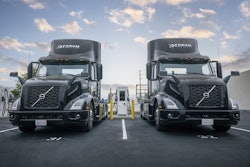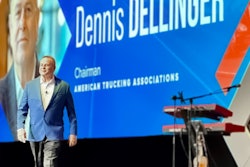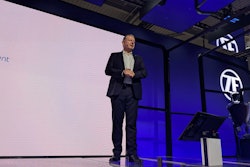Trucking news and briefs for Friday, Nov. 1, 2024:
Daimler puts electric Cascadia to work at Detroit engine plant
Daimler Truck North America (DTNA) has taken another step toward decarbonizing its logistics operations by launching its first battery-electric Freightliner eCascadia at its subsidiary, Detroit Diesel Corporation (Detroit), located in Redford, Michigan.
The Freightliner eCascadia will be integrated into DTNA’s operations at the Detroit Logistics Center located in Livonia, transporting critical components between Detroit’s offsite warehouse and the Redford production facility. The electric truck deployed in Detroit’s shuttle program will be operated by Load One LLC (CCJ Top 250, No. 159).
Their route and the consistent payload are ideal for electric truck use, DTNA said. As equipped, the eCascadia has a typical range of 220 miles and will be recharged at the Detroit Logistics Center.
“Detroit’s operation is focused on driving efficiency in today’s market while preparing for growth over the coming years,” said Matt Pfaffenbach, Detroit plant manager. “Investment in key partnerships, like our relationship with Load One, is critical to maintaining success as our industry transforms in the years to come.”
Load One is a valued partner for its commitment to safety, professionalism, and strong on-time delivery performance, making them an important contributor to Detroit’s ongoing success.
“Load One is thrilled to work with our long-term partner Detroit and DTNA as we take the first steps together in ushering in a future generation of class 8 vehicles. Load One continues to work towards advancement and as a good steward to our planet,” said John K. Elliott II, executive chairman at Load One.
Shippers’ market conditions improved in August
Shippers saw an improvement in market conditions in August, much like motor carriers, as a result of falling fuel prices. Shippers’ market improvement was also helped by weaker freight rates during the month.
FTR’s Shippers Conditions Index rose in August to 2.9 from the 0.5 reading in July. Factors that tend to have a more indirect impact on shippers – freight volume and capacity utilization – were nearly neutral contributors during the month, FTR noted.
“A shipper-friendly market is hanging on, and we see few clear signs that the situation will change much soon,” said Avery Vise, FTR’s vice president of trucking. “Our outlook is for a more neutral environment in 2025, but we do not see much on the horizon that will make for more than just a marginally unfavorable market for shippers overall.”
Faymonville to expand heavy-haul trailer production to U.S.
An overseas manufacturer of super-heavy-haul trailer equipment has selected a site in the U.S. for its first stateside production facility.
The Faymonville Group selected a site in Little Rock, Arkansas, at the Port of Little Rock, which provides the company with access to major interstates, Class I railroads, navigable waterways and a national airport.
 The site covers 409,000-square-feet in Phase 1, expanding to 624,000-square-feet in Phase 2.Faymonville Group
The site covers 409,000-square-feet in Phase 1, expanding to 624,000-square-feet in Phase 2.Faymonville Group
Once fully developed, the project will create 500 jobs. Faymonville intends to invest more than $100 million. Additionally, the project is expected to create 389 indirect and induced jobs in Little Rock and surrounding communities, generating a $239 million economic impact.
The Faymonville Group is a family-owned company now in its 7th generation, where a dedicated team of 1,400 people operates across four locations in Belgium, Luxembourg, Poland, and Italy. Together, they produce approximately 3,000 units annually. Their vehicles are delivered to 125 countries, generating a revenue of around $500 million in 2023.
With their three vehicle brands -- MAX Trailer, Faymonville, and Cometto -- the Faymonville Group is the worldwide leading full-range manufacturer of vehicles for heavy load and special transport. The semi-trailers, low-loaders, modular vehicles, and self-propelled trailers are used to transport anything exceptionally heavy, long, wide, or tall. The brand portfolio includes transport solutions for payloads from 16.5 U.S. tons to 27,500 U.S. tons and beyond.
The modern facilities, covering a production area of 1,884,000 square feet, form the foundation for unique, high-tech products. The Faymonville Group invests heavily in new machinery and process improvements, with over $126 million invested between 2017 and 2023.
“We don't just supply special vehicles, we provide comprehensive transport solutions,” said Alexander Fickers, CEO of the Faymonville Group. "We proudly delivered our first vehicle to the U.S. in 2016. What we particularly value about the U.S. market is its enormous potential, its practical, solution-driven mindset, and the much simpler administration compared to Europe."
Currently, a team in Luxembourg is working on new products that will bring significant added value to the U.S. market. In the first phase, individual components will be manufactured in Little Rock, while preparations for in-house production are underway. Additionally, service and spare parts support for Cometto-branded vehicles will be strengthened.:
“By early 2026, the production will be operational, and the vehicles will proudly bear the ‘Made in America’ label, with the goal of long-term success in the U.S. market,” said Yves and Alain Faymonville.
Daimler’s Rizon brand ships first EVs to Canada
Rizon, Daimler Truck’s newest brand of all-electric trucks, announced the arrival of its first shipment of class 4-5 vehicles to British Columbia, Canada. The shipment is the first since Rizon’s initial launch into the Canadian market in April 2024.
 This shipment includes the first 12 units of a 22-vehicle order, with the remaining units scheduled to arrive in November.Daimler Truck North America
This shipment includes the first 12 units of a 22-vehicle order, with the remaining units scheduled to arrive in November.Daimler Truck North America
After being upfitted with various bodies – such as dry boxes, service bodies, and landscape dumps – 19 of the units will be delivered to customers in British Columbia and Quebec. The remaining three units will be used for demonstration purposes. These vehicles will be distributed to locations in British Columbia and Quebec.
Customers include municipalities, rental and leasing providers, as well as freight and logistics companies.
“I’m very excited the first order of Rizon trucks is reaching Canada and will soon be on the streets serving customers with zero-emission operations,” said Andreas Deuschle, the Global Head of Rizon Truck. “The market response has been enthusiastic, and we are proud to provide Canada with the very best electric commercial vehicles on the market.”
In addition to the delivery, Rizon is expanding its dealership network in Canada by partnering with Globocam, one of Québec's largest commercial vehicle dealerships. This partnership adds three new locations across Québec and Ontario, complementing the existing six in British Columbia.
Rizon’s trucks will qualify for the Canadian government’s Incentives for Medium- and Heavy-Duty-Zero-Vehicles (iMHZEV) program, which has been in effect since 2022. A Rizon truck will qualify for approximately $75,000 at the point of sale under this program. The trucks may also qualify for additional provincial incentives up to $75,000 in B.C. and $100,000 in Quebec.
Rizon will offer four model variants for Canadian customers – the e16L, e16M, e18L, and the e18M – with a versatile mix of configurations and options suitable for each customer’s unique requirements, ranging from 15,995 to 18,850 pounds in gross vehicle weight (GVW). The vehicles can run up to 257 km (for L size variant with 3 battery packs) and up to 177 km (for M size variant with 2 battery packs) on a single charge.











